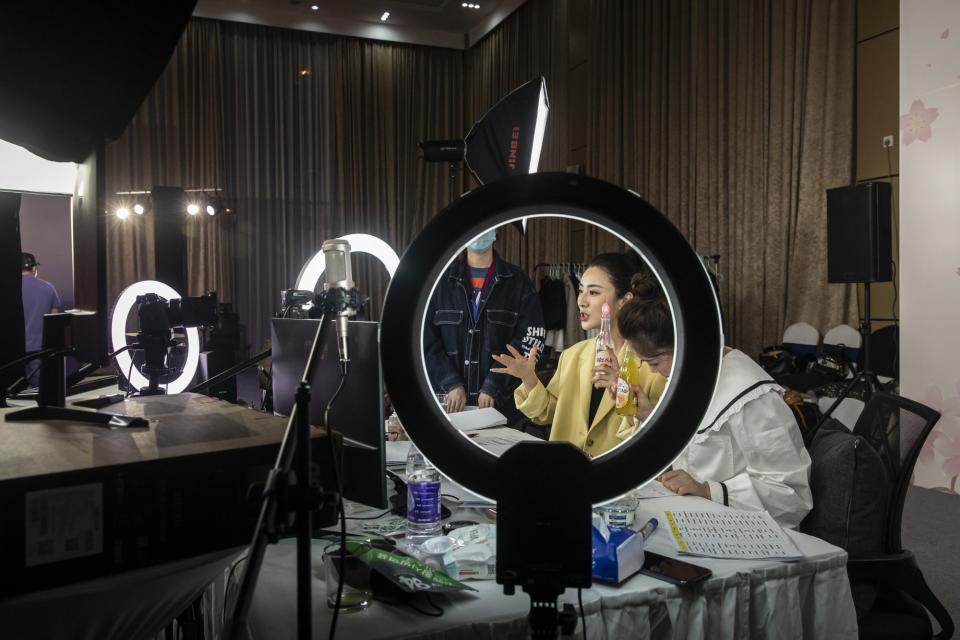Agencies Behind China’s Top Livestreaming Stars Plan IPOs
(Bloomberg) --
The incubators behind two of China’s most popular influencers are making preparations for initial public offerings as competition in the live-streaming e-commerce market intensifies.
Meione, the Shanghai-based agency behind China’s “lipstick king” Austin Li Jiaqi, is looking to hire a chief financial officer ahead of a possible U.S. share sale, according to people familiar with the matter. The firm, backed by Whales Capital and DT Capital Partners, is considering raising as much as $300 million, one of the people said.
Meanwhile, Hangzhou-based Qianxun, which houses China’s No. 1 influencer Viya, is also planning an IPO, according to another person with knowledge of the matter. Qianxun, which is backed by billionaire Jack Ma’s Yunfeng Capital, will likely list overseas, the person said. The people declined to be identified as the discussions are private.
The pair of IPOs promise to peel the lid off one of China’s largest and most dynamic internet arenas. Pioneered by Alibaba Group Holding Ltd. as a marketing tool in 2016, livestreaming e-commerce has evolved from an online version of the Home Shopping Network into a singular Chinese mashup of 24-hour high-quality entertainment, hard-sell antics and promotional gimmicks that generates $149 billion of sales annually. Top pitchpeople like Viya and Li have become celebrities in their own right, commanding followings of hundreds of millions, but the finances and business structures of the industry remain in their infancy.
“The additional funds will allow them to upgrade their tech and systems to be much more efficient, generate more data, etc to make better decisions and ultimately be more profitable,” said Mark Tanner, managing director of Shanghai-based marketing and branding firm China Skinny. “It will also help them attract new budding KOLs” or key opinion leaders.
Deliberations are at an early stage for both companies and there is no guarantee that Qianxun and Meione will proceed with their listing plans. Meione didn’t respond to repeated requests for comment, while Qianxun declined to comment.
Viya and Li are among the most successful e-commerce influencers in China, with combined sales of 53 billion yuan last year, according to market research firm iiMedia. Li reportedly once sold 15,000 lipsticks in just five minutes, while Viya has helped multinational corporates from Procter & Gamble Co. to Tesla Inc. get their goods in front of Chinese consumers. She’s even sent a small rocket into space -- an item she helped Wuhan-based Casic Rocket Technology Co. sell during a streaming session last year.
Read more: China Millionaire Livestreamer Viya Shows Online Shopping Future
The companies are seeking to shore up their warchests as competition intensifies. There were about 28,000 such agencies in China as of the end of 2020, up from just 160 in 2015. New online celebrities have mushroomed across the country, fueled by the rise of short video platforms such as Kuaishou Technology and TikTok’s Chinese twin Douyin. Even Fan Bingbing, once one of China’s top actresses before a high-profile tax scandal, and corporate cheftains like Xiaomi Corp.’s Lei Jun have turned to the medium to sell their products.
Growth in China’s live-streaming e-commerce is also moderating. Data from iiMedia show that the sector expanded 122% in 2020 from a year ago and may grow just 25% this year, a significant drop from the 600% sales surge seen in 2018.
For agencies seeking to go public, success is dependent on the popularity of its celebrities. Alibaba-backed Ruhnn Holding Ltd, China’s first influencer incubator to go public, saw its market valuation plummet roughly 70% from its listing, in part because of a scandal involving one of its top influencers and Jiang Fan, an Alibaba senior executive. The stock was delisted in April.
(Updates with analyst quote in fifth paragraph)
More stories like this are available on bloomberg.com
Subscribe now to stay ahead with the most trusted business news source.
©2021 Bloomberg L.P.

 Yahoo Finance
Yahoo Finance 

